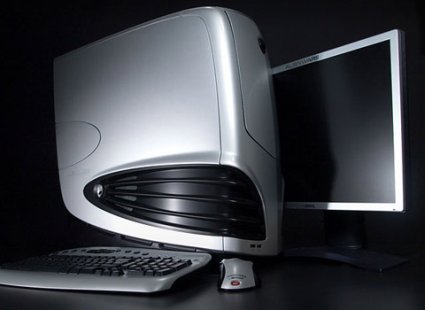This post has not been edited by the GamesBeat staff. Opinions by GamesBeat community writers do not necessarily reflect those of the staff.
As a kid in the 1990s I was fascinated with the widespread acceptability of the desktop computer. With the early days of the internet and the ever-increasing power of computer hardware, it was easy to be thrilled at the prospect of the new wonder machine that was promised to change all of our lives. The idea of a home computer was exciting to me at that age and often I could be entertained by nothing more than the word processor or MS Paint program.

Then someone told me I could play games on this machine. Not only that, but a majority of these games I had never heard of. The first game I owned and played was a team based first person shooter called Tribes. I was elated. So started my love of PC gaming.
Fast forward almost fifteen years later. Now I don’t even consider PC gaming a viable option. What happened, exactly? What has brought PC gaming down in burning shambles, like a forest being purged by bright fire into the night?
A lot of things, really. Allow me to discuss the various.
PC gaming has always seemed to have an admission fee attached to the platform. Of course, this is because the games you can play are purely based on hardware. Those who are of the console persuasion may think that this is an odd occurrence due to the fact that console gamers are also limited to what they can play by hardware, but in a very different way. Lately, though, more and more hurdles have popped up in the way of those whom would like to hang on to PC gaming.
Who or what is at fault? That is a tricky question.
To be simple, there are three major blockades in the body of water that is PC gaming. As usual, and the most expected problem, is hardware. No surprise there as this has always been the issue with choosing PC over console. As of late the rules have changed. Piracy has become more rampant, and as such publishers are far more weary of a PC release. Point in fact, some longtime PC supporters have completely avoided the platform, or have gone out of their way to make the process of playing on PC so frustrating that those of us who have tried to stick out the rough times simply have no other option but to walk the proverbial trail of tears back to console gaming only.
Let’s take a look at the various troubles and impending death of the PC gaming platform.
ISSUE ONE: Hardware 
The hardware hurdle has always been the big nullifier for those wanting to play on the PC platform. This issue was much harder to get around in the early day of PC gaming, as home computers simply weren’t built with any kind of relative power. Now a days you can’t sneeze in a Best Buy without hitting a laptop of desktop with at least six GBs of RAM and a video card. In the early days of PC, the video card was the biggest issue to get around, as the hardware expanded to include such things as “3d accelerators” and “Visual shader extenders”. In a way there was also an accessability hurdle to jump that many did not feel the need to go after. Figuring out hardware was a challenge before computer use before so prevalent. Now, though, the hardware problem has become something else entirely.
As I said, most people have computers with a large amount of power, the problem is that this may not be the right kind of power. Often times, what you need to play a certain game isn’t always stated and can lead to problems. What kind of problems? Allow me to explain.
Not being an XBox 360 owner, I opted to try and buy Bioshock 1 for PC. I figured this would be my only chance at playing the game. Little did I realize that the suggested requirement of an NVIDIA video card should have been taken literally, as the game would not even start up due to the ATI card that was living in my system. After hour of searching, being frustrated at potentially losing sixty dollars on a game I would never get to play, and digging through practically all of Google I found others with a similar problem. As it turns out, a small group had been working on a workaround to make the game work with other cards. Of course, 2K Games refused to accept this patch as official, and promptly auto patched the game to not be usable with said patch.
A few months ago, I finally bought a new video card and was able to play Bioshock. Well… At least I got to play it.
I guess I should be happy the game came out on PC at all, because I feel that if the game came out as of late I may not have had the chance. Why? Let us continue, shall we?
ISSUE TWO: DRM
Many games now come with some sadistic form of DRM. What is DRM, you ask? Digital Rights Management is a fancy phrase for “You bought the game, so only you can play said copy of that game, sucker”. DRM can be as simple as a serial key on the instruction manual, or something stupid like requiring an internet connection on at all times so your copy of the game is validated, and if any time you disconnect your save is deleted.
Wait, what?
Some DRM has become extremely frustrating to deal with. So much to the point that most will chose to purchase the console version of a game, even if the PC counterpart is cheaper (which as became a trend as of late. Surely a method to increase PC game sales). The most frustrating for me would probable have to be Steam. Here comes the exposition.
I bought Left 4 Dead 2 for PC last week, as the game was only twenty dollars, and much like my Bioshock experience, was maybe my only chance to play a game that will never come to my platform of choice. I carefully studied the back of the box to make sure I had the ability to play said game and all seemed clear. Though, I was confused by this little passage (taken verbatim):
“Product offered subject to your acceptance of the Steam Subscriber Agreement. You must activate this product via the internet by registering for a Steam account and accepting the SSA.”
Little did I realize what I had fallen into. I got the game home and was surprised to find the autorun for the game was not the installer for the game I bought. God, no! Instead, a window to install steam kept badgering me. So, I jumped through the hoops of Steam, hoping that once I installed the program I could finally just install the game and play.
Of course not.
Steam proceeded to inform me, after installing the game off the disc, that said disc only contained 80 percent of the files and I would have to download almost 2 GBs of extra files just to install the game. Why is this a problem? I am on a satellite internet connection with a download cap of 1 GB. Didn’t I purchase the game already? Aren’t I entitled to the ENTIRE file?
So, my computer went on a trip to a friend with real internet. After three days, I was finally able to play the twenty dollar game I bought. Yay?

Why is DRM so annoying? Are publishers intentionally trying to scare gamers away from PC? No, not at all. Sadly, they are just trying to protect what is theirs. This leads us to my third, and most obvious issue.
ISSUE 3: PIRACY
I didn’t include piracy along with DRM because I feel the biggest issue with PC gaming, and what I feel will inevitably kill the platform, is that developers simply do not want to take the risk. The amount of titles, and the size of PC game selection at most stores as dwindled to a sad mark. Most Gamestop stores do not even put their PC section on display anymore due to the small amount of titles and the even smaller market for said titles.
More specifically, games that were coming out for PC before aren’t even being considered due to piracy. The best example I can give is that recently Super Street Fighter 4 was taken off the PC release list. Capcom specifically stated piracy to be the main issue for cancelling the release, even though the PC version of Street Fighter 4 was not only well received but also well supported by a strong community.
The fact is that more and more developers will start avoiding PC completely. Less chances will be taken. Soon enough, the platform will become desolate. After all, why should publishers release a game on PC that will have more sales, and in theory more security when released on the console platform?
I find the trend to be truly heartbreaking, as my love for PC gaming has always been strong. Soon enough we will all have to mourn the loss of a great gaming platform that nobody ever really paid attention to in the first place.
